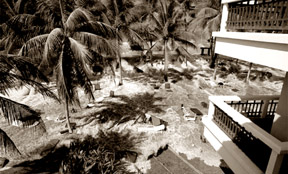|
observer |
|
|
|
|
|
OTHER LINKS |

|

|

|
Kadal kol: racial memory or recent disasterThe suddenness of the tidal wave and the magnitude of the destruction it spawned was so electrifying, that there was certain amount of un-preparedness in the local languages on what its most precise description ought to be.
In Sri Lanka, the Sinhala term muhudha godagaleema became established about the second day after the disaster, mostly by its use in the Sinhala media. Muhudha godagaleema, translated literally means: sea (to) land washing-away. The word galeema we understand, denotes excessive flow implying that it is harmful, bad or inimical. In Tamil, the presenters (or are they chatterers ) over the private radio channels used the term kadal kondalippu soon after the phenomenon occurred. According to the Tamil Lexicon (TL) word kondalippu means: To be rough or boisterous; to swell as the sea. However, it should be said the word kondalippu in Tamil is not perceived as something potentially dangerous or destructive as its English translation in the TL indicates. Perhaps the tacit admission that kadal kondalippu was inadequate to describe the phenomenon might have been the cause for a new term to be coined from old Tamil roots. Thus the terms aazhi alaikal (ocean waves) and per alaikal (massive waves) come into currency. But even these words are not sufficient to describe the total meaning of the phenomenon in precise terms. The LTTE s statement used the term nila atthirchchi per alaikal meaning (massive waves created by an earthquake). The Tamil Nadu media used kondalippu in the first few days after the occurrence, but soon settled (in inimitable Madras style of Tamilising every known foreign word) for sunami alaikal. For all these variations, Tamil has its own historic memory of tidal waves swallowing celebrated centres of Sangam civilisation. The traditional narratives of the Sangams and their collapse use the term kadal kol. The term literally means sea-getting, implying the land was got by the sea. Here kol a nominal form of the verb kol does not take on its wonted meaning of take (over). Rather it means devoured by the sea. Students of Tamil literature know that the incident in ancient times of the sea devouring the land has been set down almost as a racial memory in the Silappathikaram. In the Silappathikaram it is said the cruel sea took (devoured) the Pahruli River and the many-layered peak of Kumari. (It is believed that the rock at Kanyakumari on which the Vivekananda Memorial stands succumbed to the sea). In Sri Lanka, except in the case of a Tamil daily, the term kadal kol has not been used. It is strange that the Tamils who are tradition-bound when it comes to glossary-making should prefer to use the Tamilisation of the word Tsunami rather than the original Tamil word kadal kol. All these variations however occur only in Tamil letters. For the general public made victim of the raging waters of the all-devouring sea, the term kadal peruhi vanthathu (the sea swelled with a roar) seems good enough. Experience always enriches vocabulary. Courtesy: Northeastern Monthl |
 The word tsunami, a Japanese one entered the English vocabulary
because of the frequent occurrence of tidal waves in that part of the
world, and the technology and expertise developed in Japan to deal with
the phenomenon. Tsunami, which means powerful or high waves in Japanese,
has become current in English because the popularity of Japanese
technology led to its usage in the English-speaking countries, and
because the word has a precision absent in its English counterpart,
tidal wave.
The word tsunami, a Japanese one entered the English vocabulary
because of the frequent occurrence of tidal waves in that part of the
world, and the technology and expertise developed in Japan to deal with
the phenomenon. Tsunami, which means powerful or high waves in Japanese,
has become current in English because the popularity of Japanese
technology led to its usage in the English-speaking countries, and
because the word has a precision absent in its English counterpart,
tidal wave. 







